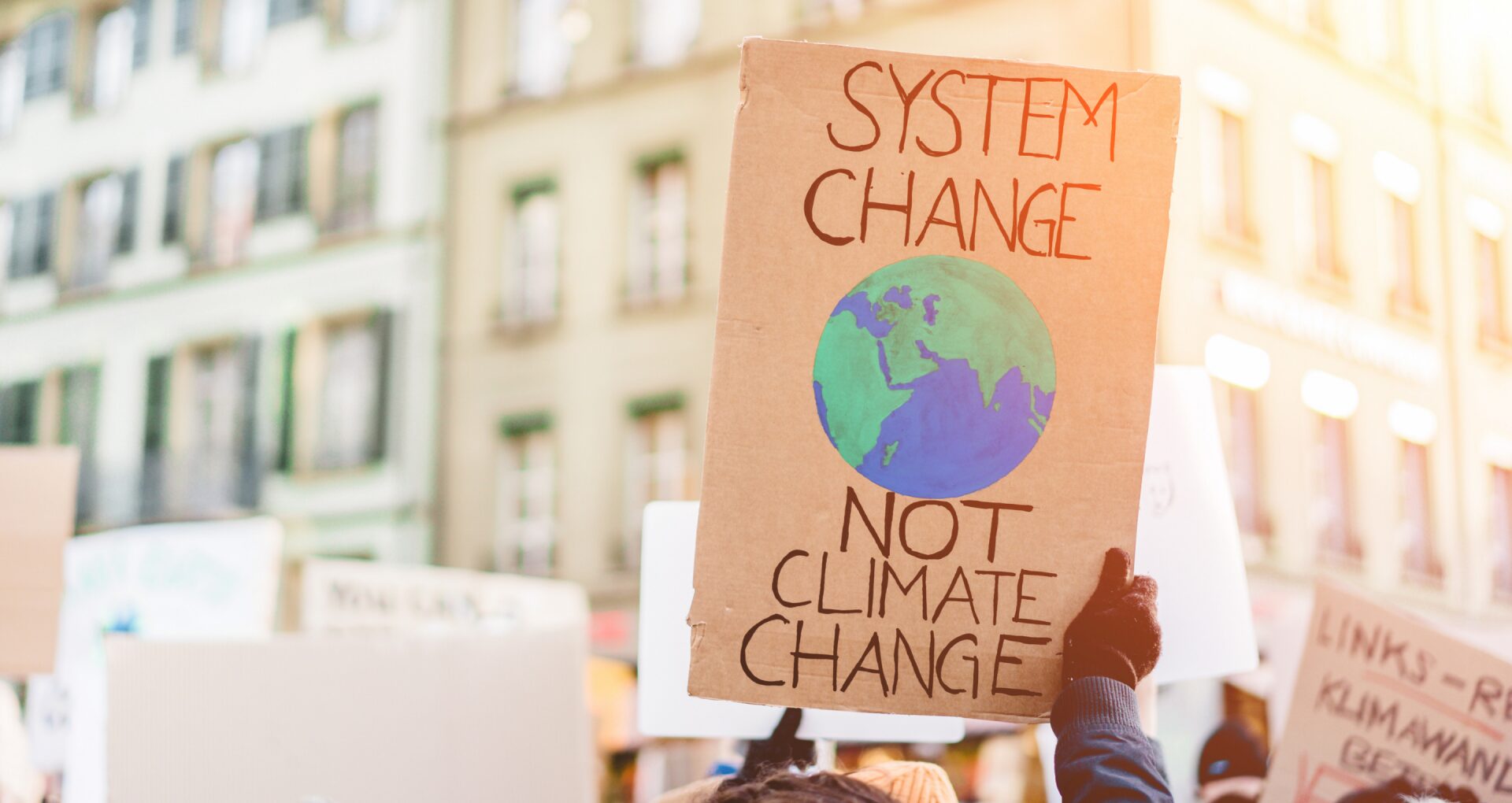At GAIA the fight for climate justice is woven into all of our work
Climate change is a global issue, and yet the effects of our climate crisis do not impact us all equally. It is well established that the industrialization of the Global North has largely contributed to climate change, while the Global South bears the brunt of its devastating effects. While working towards the Paris Agreement’s overarching goal of limiting global warming above a 1.5°C rise in temperature, GAIA’s work on climate is rooted in our commitment to social justice. We believe the Global North must take accountability for its role, and that solutions must not only address GHG emission reductions globally but address climate justice inequalities as well.

Mitigation, Adaptation, and Additional Benefits
As the climate crisis deepens, urgent action is required to both mitigate GHG emissions and adapt to the extreme weather events and health hazards of a rapidly changing climate. The waste sector remains an underutilized opportunity: through zero waste strategies, cities everywhere can not only dramatically reduce emissions, but also strengthen resilience and provide substantial additional public health and economic benefits.
Mitigation
The mitigation potential of the waste sector is largely underestimated and underutilized. Upstream waste management—which includes strategies that separate organic waste and prioritize reduction, reuse, and recycling (in that order)—sharply reduces powerful, short-lived GHGs such as methane as well as reduces emissions and pressure for natural resources from other sectors (such as mining, farming, manufacturing, transportation, and agriculture). As a result, the mitigation potential of the solid waste sector is greater than its total emissions, making it a potential “net negative” sector.
Read our report to find out how:
- The zero waste model can transform the waste sector into a net negative source of GHG emissions
- Composting is a climate game changer
- Source reduction of waste is the best way to reduce GHG emissions, especially for food and plastic (and is better than recycling)
- Energy recovery is not an effective mitigation strategy
Adaptation
Zero waste systems help cities build resilience against the increasingly frequent extreme weather events and health hazards brought by climate change. Poor waste collection and management are among the factors that leave cities particularly exposed to these events. Zero waste systems help cities become more resilient by: mitigating floods, reducing disease transmission, and improving soil quality.
Read our report to find why:
- Bans on single-use plastic (SUP) are necessary as plastic waste exacerbates flooding
- Banning SUPs and better waste collection will keep disease vectors at bay
- Composting does wonders to improve soil resilience
Additional Benefits
Well-implemented zero waste strategies benefit societies in ways that go beyond their ability to curb the impacts of climate change: they improve many of the most fundamental ways in which society functions—through associated environmental, economic, social, and political and institutional benefits.
Read our report to find out how zero waste systems:
- Do more for our health and the environment than lower GHG emissions
- Contribute to a thriving economy
- Provide a wide range of social benefits
- Strengthen the quality of governance itself
Methane Mitigation
In addressing climate justice, tackling methane emissions is of particular importance: mitigating methane emissions is the fastest way to reduce global warming. This is because methane, a powerful greenhouse gas trapping 82.5 times as much heat as CO2 over a 20-year timespan, is also much shorter-lived. It breaks down in just 12 years on average, unlike CO2, which takes centuries.
The waste sector is the third-largest and fastest-growing source of human-linked methane emissions. With landfilled organic waste representing the largest proportion of the solid waste stream, keeping organic waste from landfill through zero waste practices is key to rapid methane reduction. Through composting alone, 78% of landfill methane emissions can be avoided, while 90% of anthropogenic methane emissions can be reduced from the waste sector as a whole through zero waste solutions.
Effective Policies for Climate and Waste
As a key component of the Paris Agreement, countries are committed to producing and regularly updating NDCs (Nationally Determined Contributions). Climate agendas are what hold countries accountable, and our work on policy includes reporting on the state of waste management in NDCs. While the waste sector features prominently, countries are still failing to make the most of the sector’s potential.

At GAIA, we are pushing for countries to develop and incorporate better waste management plans as well as national methane action plans as part of their climate agendas by providing evidence of zero waste’s climate mitigation potential. We also produce policy guidance for actionable solutions against GHG emissions that are effective, economical, and support elements of a just transition, and we amplify the work and importance of the informal sector: a critical right-holder in waste management’s transformation.
Through our diverse international delegation of advocates, academics, city policymakers, grassroots activists, and waste pickers, GAIA also represents and amplifies just, equitable, and effective solutions at the global negotiations within the UNFCCC. One of our greatest victories includes amplifying the voices of waste pickers and ensuring their role as key players in the climate justice movement to reorient climate finance away from incineration and towards grassroots recycling movements.
Climate Finance for Climate Justice
Given the inherent inequalities around climate change and the commitments historical polluters have made to support countries in the Global South, it is critical to establish development finance and climate policies that prohibit environmental deterioration, prevent further health inequalities and community displacement, and protect local jobs and human rights objectives.
Accounting for Injustice
Despite concrete benchmarks for the transformation of the global economy under the Paris Agreement, the Sustainable Development Goals, and other international commitments on climate and sustainability, further considerations on how and where to direct investments in order to support a truly resilient and sustainable economy get overlooked or muddled by opposing agendas. In fact, most climate finance to reduce methane emissions in the waste sector continues to fund waste incineration and other false solutions as opposed to real zero waste solutions.
The Global South is owed a huge climate debt. Climate finance needs to account for this injustice, and be directed towards real zero waste solutions rooted in environmental justice values and principles.
Campaigns for Climate Finance
GAIA produces reports that provide clear criteria on activities that need to be included and prioritized in climate finance, and campaigns against polluting industries and accounting gimmicks that divert funds from real climate solutions.
Through strong climate science, commissioned research, and policy campaigns, GAIA advocates for the inclusion and prioritization of zero waste policies in climate agendas. A recent great victory includes keeping incinerators out of the EU Taxonomy — the master list of climate-friendly strategies that the EU will support and fund. Our work on climate finance has also been instrumental in improving the climate finance criteria of the Climate Bonds Initiative and the Asian Development Bank.
Today, GAIA Asia Pacific continues to push back on the Asian Development Bank’s Draft Energy Policy, which still endorses Waste-to-Energy (WtE) incineration — calling it a “circular economy solution.” Failing to recognize WtE’s significant cost to planetary and human health undermines the Bank’s commitment to a low-carbon and inclusive development.
Featured Resources
- Zero Waste to Zero Emissions: How Reducing Waste is a Climate Gamechanger
- Methane Matters: A Comprehensive Approach to Methane Mitigation
- A Key to Rapid Methane Reductions: Keeping Organic Waste From Landfills
- Methane Matters: A Comprehensive Approach to Methane Mitigation
- Plastic is Carbon. Unwrapping the ‘Net Zero’ Myth
- Zeroing on Zero Waste: GAIA at COP27
- COP27: One Step Forward, Two Steps Back
- Wasted Opportunities: A Review of International Commitments for Reducing Plastic and Waste-Sector GHG Emissions
- Plastic & Climate: The Hidden Costs of a Plastic Planet
- Sustainable Finance for a Zero Waste Circular Economy
- Zero Waste Strategies Towards Carbon Neutrality




























